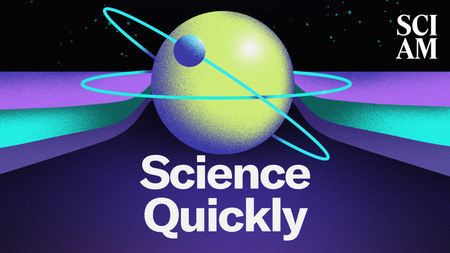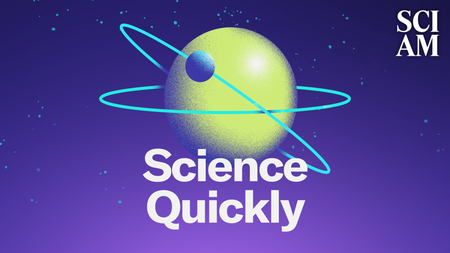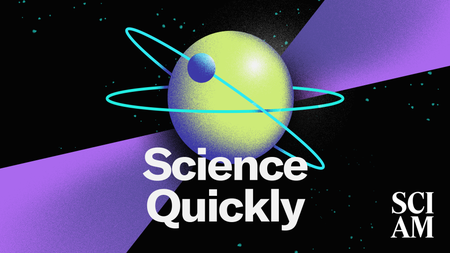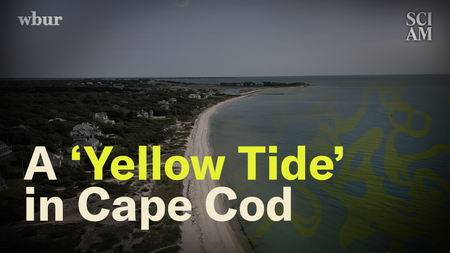
Could Weight-Loss Treatments Lead to an Uptick in Scurvy?
We cover a 3.26-billion-year-old meteorite impact, the spread of bird flu and a scurvy case study that serves as a cautionary tale in this week’s news roundup.
Anaissa Ruiz Tejada is a multimedia producer and editor who tells science stories using graphics, audio and video.

Could Weight-Loss Treatments Lead to an Uptick in Scurvy?
We cover a 3.26-billion-year-old meteorite impact, the spread of bird flu and a scurvy case study that serves as a cautionary tale in this week’s news roundup.

Microbes Are Evolving to Eat Cleaning Supplies, and Whooping Cough Is Making a Comeback
Kick off the week by catching up on the latest science news.

Hurricane Milton Delays Launch of Europa Clipper, and Science Nobel Awards Highlight AI
A roundup of the science Nobels, the latest COVID updates and the Europa Clipper launch delay.

Stem Cell Treatments for Diabetes and a Dolphin’s Smile
We cover the spread of Marburg virus, a stem cell treatment for diabetes and the way dolphins smile in this week’s news roundup.

An Effort to Fight against the Spread of Misinformation in Science and an Overwhelming Number of Plastic Water Bottles
Here’s how misinformation and distrust in science are impacting global well-being. Plus, we present our regular roundup of this week’s science news.

How Pregnancy Changes the Brain, and How Lizards Make DIY Scuba Gear
This week’s news roundup explores how the brain is affected by pregnancy, the way “scuba diving” lizards breathe underwater, and much more.

Jellyfish Clones Swarm British Columbian Lakes, and Measles Cases Spike in Oregon
This week’s news roundup: Jellyfish clones are multiplying in British Columbia’s lakes, measles cases are on the rise in Oregon, and a new study finds cell phones aren’t linked to brain cancer.

Watch Tornado Science at the Movies and the Perseids in the Sky
Windows devices go down, Twisters brings tornadoes to the big screen and COVID’s summer surge in this week’s news roundup.

Cleaning Up Paris’s Poop River for the Olympics
The Seine will be the stage for the Paris 2024 Olympics’ Opening Ceremony—and for its marathon swimming events. But this urban waterway is challenging to keep clean.

Astronauts Can Drink More Recycled Pee Than Ever, and You Can Still Catch the Plague
It’s been 55 years since the Apollo 11 mission, innovative “stillsuits” designed to recycle astronaut pee could enhance spacewalks, and a surprising case of the plague has occurred in Colorado.

Blast from the Past: In 1924 Scientific American Loved Coal (and Telepathy)
It’s well known that petrochemicals are toxic to our health. Here’s how to steer clear of these by-products of the fossil-fuel industry.

The Supreme Court Preserves Emergency Abortion Access, and NASA Plays It Safe With Starliner
Emergency access to abortion is preserved—for now. Also, NASA postpones the return of Starliner astronauts, and we’re tracking the spread of bird flu, dengue and mpox.

Life for Researchers on This Icebreaker Is Cold and Fulfilling
Get a behind-the-scenes look at how researchers live and work on a U.S. icebreaker making its way through the waters of West Antarctica.

How We Can Keep Ourselves and Our Communities Cool in the Summer Heat
Heat waves are getting hotter, more frequent and longer. But there are ways to keep yourself and your community cool.

Penguins and Ice Samples Make This Research Vessel Paradice
To unravel the effects of melting sea ice, researchers drill the frozen waters around Antarctica and receive a surprise visit from a group of penguins.

Snacking on Cicadas Can Be Sustainable and Delicious
Make the best of the “double brood” of cicadas with insect kimchi and tempura-fried bugs.

Cooperation Is the Key to Surviving the Apocalypse
Cooperation theorist Athena Aktipis talks about zombies, game theory, go bags and more in her new book, A Field Guide to the Apocalypse.

Cape Cod Faces a Rising 'Yellow Tide'
Tourism is big business on the cape, but a growing environmental issue could disrupt the lives of tourists and residents, alike.